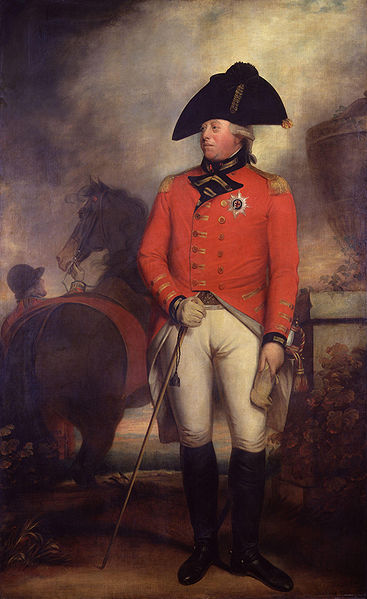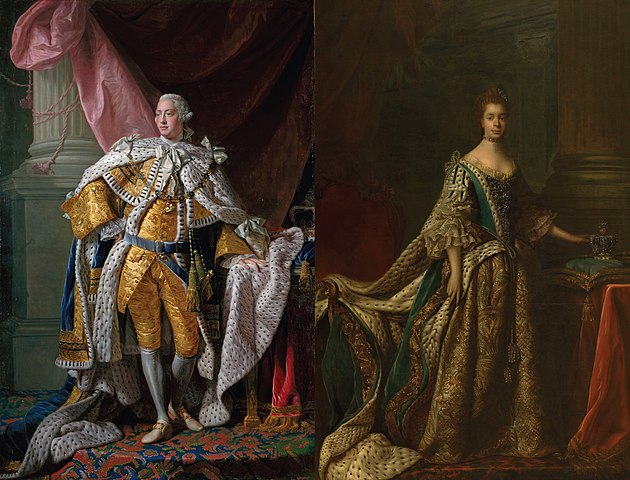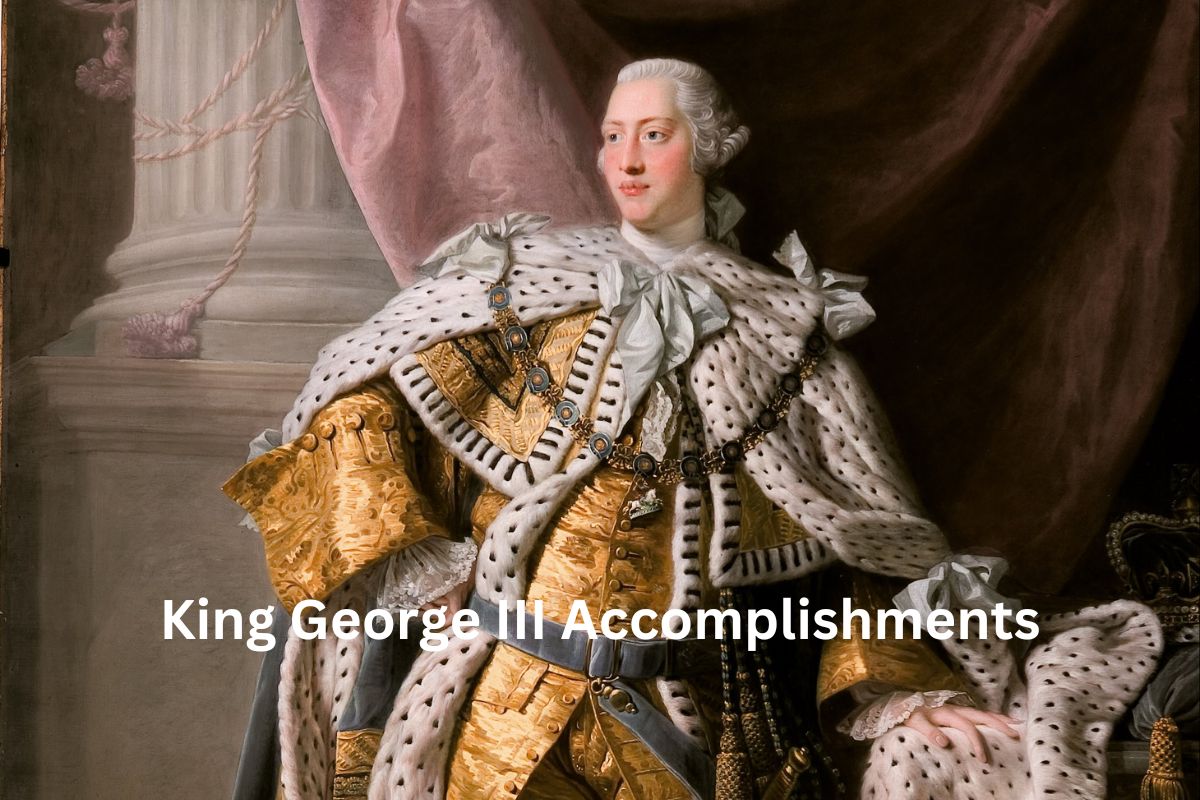King George III, born on June 4, 1738, in London, was the King of Great Britain and Ireland from 1760 until his death in 1820. He was the third British monarch of the Hanoverian dynasty and the longest-reigning king in British history at the time, serving for 59 years.
He played a pivotal role in shaping the British Empire and faced significant challenges during his reign. Despite his struggles with mental health later in life, he made enduring contributions.
He established the Royal Academy of Arts, supported scientific institutions, and signed the Slave Trade Act of 1807. His reign witnessed the growth of the British Empire and left a lasting impact on British history before his death in 1820.
Accomplishments of King George III
1. Leading Britain during the American Revolution
King George III’s leadership during the American Revolution was a significant accomplishment, albeit with mixed outcomes. He staunchly opposed the colonists’ demands for greater autonomy and fought to maintain British control over the American colonies.

Under his reign, the British forces initially achieved several military victories, such as the capture of New York City and the defeat of George Washington’s troops in the Battle of Long Island.
Also Read: Facts About King George III
However, as the war progressed, the tide turned against Britain, and the American colonists gained support from other European powers, such as France. Despite the ultimate loss of the colonies, George III’s determination to preserve British authority showcased his unwavering commitment to the British Empire.
2. Founding the Royal Academy of Arts
King George III’s establishment of the Royal Academy of Arts in 1768 was a notable accomplishment. The academy was formed to promote the arts in Britain and provided a platform for artists to showcase their work.
Its founding marked a significant shift towards supporting and encouraging artistic endeavors in the country. Over the years, the Royal Academy of Arts has become a prestigious institution, hosting exhibitions, promoting artistic education, and nurturing the talents of numerous renowned artists.
3. Patron of science and scientific institutions
King George III had a strong interest in scientific exploration and advancement. He actively supported various scientific institutions and funded expeditions, experiments, and observations.
George III provided financial backing for important scientific endeavors, such as Captain James Cook’s voyages of discovery and the astronomical observations conducted by astronomers like William Herschel.
His patronage helped propel the growth of scientific knowledge and exploration during his reign, contributing to advancements in fields like astronomy, botany, and medicine.

4. Establishment of the Royal Observatory
King George III’s establishment of the Royal Observatory in Greenwich, London, in 1675 was a significant accomplishment in the field of astronomy. The observatory served as a central hub for astronomical research and the study of celestial bodies.
It played a crucial role in advancing navigation and the measurement of time, as it was the site where the Prime Meridian was established. The observatory’s contributions to astronomy and its role in defining global time standards have had a lasting impact on scientific and navigational practices.
5. Development of the Royal Botanic Gardens, Kew
Under King George III’s reign, the Royal Botanic Gardens at Kew underwent significant development, transforming it into one of the world’s leading botanical gardens. George III had a keen interest in botany and plant collection, and he expanded the gardens, acquiring rare and exotic plant species from around the world.
The gardens became a center for botanical research, horticultural experimentation, and the cultivation of medicinal plants. Today, Kew Gardens remains a renowned institution for botanical studies and conservation, housing an extensive collection of plants and serving as a vital resource for scientists, botanists, and nature enthusiasts.
6. Support for the abolition of the slave trade
While King George III’s personal stance on the abolition of the slave trade remains a subject of debate, his support for the abolitionist cause grew over time. In his later years, he became increasingly sympathetic to the plight of enslaved people.
In 1807, during his reign, the British Parliament passed the Slave Trade Act, which abolished the slave trade throughout the British Empire. Although the act did not immediately end slavery itself, it was a significant step towards its eventual abolition.
King George III’s willingness to support such legislation demonstrated a shift in public sentiment and contributed to the broader movement against the slave trade.
7. Investment in infrastructure development
King George III recognized the importance of infrastructure in promoting economic growth and connectivity. Under his reign, significant investments were made in the construction of roads, canals, and bridges throughout Britain.
These infrastructure projects aimed to improve transportation, facilitate trade, and enhance communication networks. The development of road networks, such as the turnpike roads, enabled faster and more efficient movement of goods and people.
Additionally, the construction of canals, such as the Bridgewater Canal, opened up new transportation routes for industrial areas, boosting economic activity and regional development.
King George III’s focus on infrastructure laid the foundation for improved connectivity and contributed to the modernization of Britain’s transportation systems.
8. Advocacy for agricultural improvement
King George III was an advocate for agricultural improvement and supported initiatives to modernize farming practices. He promoted new agricultural techniques, including crop rotation and selective breeding.
These practices helped to increase agricultural productivity and efficiency, leading to higher crop yields and better livestock. By encouraging advancements in agricultural methods, George III aimed to address food scarcity, improve the livelihoods of farmers, and boost the overall agricultural sector.
His support for agricultural improvement contributed to the Hanoverian Agricultural Revolution, which played a crucial role in transforming British agriculture and increasing food production.
9. Implementation of military reforms
George III recognized the need for military reforms to strengthen the British Army and Navy. During his reign, he implemented various measures to enhance recruitment, training, and modernization of the armed forces.
He expanded the size of the British Army, improving its capabilities and readiness. George III also invested in naval advancements, supporting the construction of new warships and promoting naval innovation.
These military reforms aimed to ensure the security and defense of the British Empire. George III’s commitment to strengthening the military laid the groundwork for Britain’s military prowess in subsequent years.
10. Signing the Royal Marriages Act
In 1772, King George III signed the Royal Marriages Act into law. This legislation required all members of the British royal family to seek the sovereign’s approval before marrying. The act was enacted to exert political and diplomatic control over royal marriages and alliances.
By granting the monarch the power to consent to royal marriages, George III aimed to ensure that royal unions were in the best interest of the kingdom, both domestically and internationally.
The Royal Marriages Act had significant implications for the British monarchy, shaping the course of royal marriages and dynastic alliances for generations to come.
